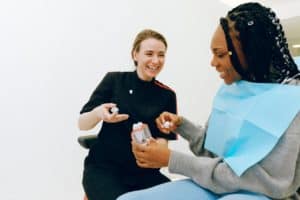
Pointy canine teeth may be a good look for a vampire. But if you’re one of the many people whose canines are pointier than you’d like, we want you to know that there are various ways that your dentist in Farmington Hills can use cosmetic dentistry techniques to reshape your teeth and revitalize your smile.
Canine teeth are those four teeth in the top and bottom of our mouths that are naturally pointy in shape. Some people refer to them as vampire’s teeth, and they can somewhat look like dogs’ teeth, hence the name canine. The unique shape of the canine teeth helps us eat by allowing us to tear, hold, and chew food. But if you think your canines are too long or too pointy, let’s check out a few ways your dentist in Farmington Hills can help.
Cosmetic dentistry isn’t only meant for people who want to get a brilliantly white smile. In fact, it can fix a whole bunch of aesthetic concerns. Three of the best ways to fix pointy teeth through cosmetic dentistry are:
Dental bonding is the most conservative way a dentist can change a tooth’s appearance. The treatment involves applying a tooth-colored material to a tooth and sculpting it into an ideal size and shape. Bonding can also fix chipped teeth, slightly overlapped teeth, and even crooked teeth.
Dental veneers are thin pieces of porcelain that are attached to the front surface of teeth. They can cover up discoloration, fill in gaps, and change the size or shape of teeth. The procedure requires your dentist to remove a small portion of enamel for the veneer to fit. But after that, you’re left with a new, natural look.
Another way your dentist in Farmington Hills can change the shape of your teeth is through tooth recontouring. This quick and easy treatment allows your dentist to use an artistic eye to gently remove tooth enamel to alter the size or shape of a tooth. Only a few millimeters of enamel are removed so it’s a painless procedure.
Changing the look of your smile doesn’t need to be complicated or expensive. Start your smile makeover journey by talking with a dentist about your options.
We have dental offices in Ann Arbor, Canton, Farmington Hills, and Livonia. Call the office nearest you, today!

Hollywood has done a great job showing characters cracking up after getting laughing gas. But is that true? Does laughing gas really make you laugh? If so, how can this be beneficial for patients visiting their dentist in Canton? In reality, laughing gas, also known as nitrous oxide, can make you laugh, but there are plenty of other benefits besides the mood boost.
How Laughing Gas Works
Many dentists use laughing gas, which is just a mix of nitrous oxide and oxygen, to help reduce anxiety and make patients more comfortable. Nitrous oxide can help minimize any pain associated with dental treatment. Even though this is a form of sedation dentistry, patients will remain conscious throughout their appointment.
Is It Safe?
Nitrous oxide is deemed safe by the American Dental Association. However, one reason that it’s safe to use in dentistry is that the patient, as well as the dosage, is monitored the entire time.
Side Effects
Another great thing about nitrous oxide is that there are few side effects, and the medication wears off quickly. Most patients can return to their normal day after treatment. Keep in mind that we may still recommend that someone drive you after your appointment.
Patients may also get giggly, hence the name laughing gas. This happens because of the way nitrous oxide interacts with the brain. Patients may also feel relaxed, euphoric, and tingling in the extremities.
Some other common, yet temporary, side effects of laughing gas that can be felt during or after administration include:
Patients are advised to eat only a small meal or snack before sedation dentistry appointments to help reduce the likelihood of nausea.
Who Should Get Laughing Gas?
Laughing gas isn’t for everyone, so make sure to talk with your dentist in Canton to see if it’s a good option for you. Some people that may benefit from laughing gas or another form of sedation dentistry include those who:
How Is Laughing Gas Administered?
Laughing gas is easy to administer. Your dentist in Canton will place a small mask over your nose and ask you to breathe normally. With each breath, you’ll inhale a mixture of nitrous oxide and oxygen. When treatment is finished, you’ll breathe pure oxygen to help flush out any leftover nitrous particles.
Dental fear or any apprehension about upcoming dental appointments shouldn’t stop you from getting the care you need and deserve. Always talk to your dentist about your concerns and if nitrous oxide or sedation dentistry is right for you.
We have dental offices in Ann Arbor, Canton, Farmington Hills, and Livonia. Call the location closest to you to schedule an appointment.

If you’re afraid of the dentist, you may feel as if you’re alone. Rest assured, you’re far from alone. In fact, about 36% of people in the United States have fear of getting dental treatment, and some even have a legitimate phobia called dentophobia. So while knowing you’re not alone may help a little, seeing your dentist in Ann Arbor can still make you feel nervous, anxious, or simply scared. We can help.
There is no one cause for dental fear, and each person is different. That’s why it’s so important to communicate with your dentist in Ann Arbor about any uncertainties you may have about your upcoming appointment. However, one of the first steps to overcoming the fear of the dentist is to try and understand where that fear comes from. Some of the most common causes of dental fear are:
If you’ve had a negative dental experience before, it’s more likely that you may develop dentophobia. Experiences in the past that have caused pain or discomfort, especially as a child, can cause a long-term aversion to dental care.
We understand that sitting back in a dental chair with your mouth wide open isn’t the most comfortable thing to do. But besides that, it can make some people feel out of control and make their anxiety spike.
Patients who grew up with or have a parent, sibling, or other role model exhibiting and expressing fear of the dentist make adopt that feeling as their own. Called modeling, simply hearing someone else talk about their fear can instill fear in yourself.
Many patients feel embarrassed by the way their teeth look or how their breath smells and may feel anxious when a dentist or hygienist is taking a good, close look. Remember, your dentist and dental team are here to help you, not to judge you.
There are many techniques available to help you actually relax in a dental office and combat your fear. Try the following tips:
Used by the Navy Seals to ease anxiety, you can adopt the 4-4-4 breathing technique at your dental appointments. Start by inhaling for 4 seconds, holding that breath for another 4 seconds, exhaling for 4 seconds, and holding that exhale for another 4 seconds. Repeat as needed.
Communicating with your dentist in Ann Arbor is crucial to overcoming dental anxiety. Make sure your entire dental team knows about your concerns, symptoms, and potential triggers. The more we know, the more we can do to help keep you at ease. In fact, many dentists offer forms of sedation dentistry designed just for patients with anxiety.
Sometimes all you need is a good distraction in order to help you feel relaxed. Ask your dentist if you can listen to music or watch a movie during your appointments so your brain can focus on something else other than what’s going on in your mouth.
Even though being afraid of the dentist is a completely normal thing, it can mean bad news for your oral health if you don’t maintain your appointments. Make sure you find the best dentist in Ann Arbor for you and your anxieties and keep up with appointments every six months to avoid dental problems from creeping up on you.
We have dental offices in Ann Arbor, Canton, Farmington Hills, and Livonia. Call the dentist closest to you to schedule an appointment today.

Every Six Months Is Key
Everyone can benefit from seeing their dentist in Canton at least every six months. These regular checkups and cleanings help prevent problems and can even catch small issues before they become big. They can also help denture-wearers in the following ways.
Oral Health
Despite the fact that dentures have replaced all of the natural teeth, there are other areas of oral health that need to be protected. Dental care goes beyond caring for the teeth as the gums, tongue, and jaw bones also need regular care. Denture-wearers, in particular, should see their dentist at least twice a year to monitor overall oral health. In fact, dentures may increase the likelihood of developing gum disease, as well as affect jaw bone density. Plus, the size and shape of the mouth change over time, which means the fit of a denture also changes. Dentures often need regular adjustments to remain comfortable.
Overall Health
Believe it or not, regular dental care can not only protect your oral health but also your overall health. Gum disease, for example, is more common in denture-wearers and should be caught as early as possible. Advanced gum disease can’t be cured and can even lead to whole-body problems such as heart disease and diabetes. Additionally, your dentist in Canton is always on the lookout for oral cancer and looks for signs of this serious disease at every appointment. Oral cancer can be treated successfully with early intervention, which makes regular dental appointments even more important.
Denture Health
Dentures are not a permanent solution to missing teeth. But they can last over 7 years with proper at-home care and regular dental appointments. Dentures can sustain regular wear and tear, and sometimes the patient doesn’t know that micro-damage has occurred. Having your denture checked at regular dental appointments can catch and fix any minor problems.
Essentially, everyone should see their dentist every six months, no matter how many teeth they have. These preventive appointments help protect your health and can prolong the life of your denture.
We’re always welcoming new patients at our dental offices in Ann Arbor, Canton, Farmington Hills, and Livonia.

There’s an appropriate time and place for do-it-yourself, at-home projects, and improvements. But your dentist in Livonia wants you to know that any social media trend involving your oral health isn’t one of them. While you should take great care of your teeth at home by regularly brushing and flossing, you shouldn’t try these four social media dental trends under any circumstances.
If straightening your teeth or tightening up small gaps is your goal, there’s a right way to go about achieving a super straight smile, and that’s by talking with your dentist in Livonia. Moving teeth is a science and an art, and if done incorrectly, can cause some serious problems. One trend popular on social media is using typical office supplies to shift teeth around. This is incredibly dangerous and can cause permanent damage to your teeth. It can also lead to jaw problems or even make teeth fall out.
A highly disturbing trend circulating on social media platforms is something called the “veneers check” where users file down their own teeth into small stubs or just in an attempt to even out some ridges. The result is the appearance of “shark teeth.” Many users are showing these filed-down teeth as a before picture prior to getting veneers. The problem is dental veneers don’t require that type of preparation. But there’s more. Filing down your teeth can be painful, lead to permanent damage, and may require additional treatment from a dentist in Livonia such as dentures.
While there are ways to whiten teeth at home, this should be done only if given approval by your dentist and only by using appropriate whitening solutions. Never dig for smile-whitening ingredients in your pantry or cleaning products and mix up a social media concoction that claims to whiten teeth quickly. Many of the ingredients used are highly acidic and when applied directly to the teeth can quickly weaken the enamel. Not to mention, cleaning products can be very harmful to overall health.
Even other trends involve using art supplies to craft individual teeth. This could be in the form of a crown, partial dentures, or even just filling in a tiny crack. Either way, the materials are often not approved as safe to use in the mouth and there’s a good chance you may be covering up a bigger problem that should be properly addressed by your dentist. The longer dental concerns go undiagnosed and untreated, the bigger issue they can become.
When it comes to improving the appearance of your smile, never take the DIY approach. Always start by talking with your dentist about your cosmetic dentistry options so you can get the smile you desire safely.
We’re welcoming new patients at all of our dental offices in Ann Arbor, Canton, Farmington Hills, and Livonia.

If you’re pregnant, especially if it’s your first time, dental care may be the farthest thing from your mind. But there are good reasons to still keep your oral health top of mind during this joyous time. In fact, your dentist in Farmington Hills recommends that everyone, including those who are pregnant, continue to keep up with regular preventive dental care every six months. After all, the truth is, that the oral health of the mom can affect the overall health of the baby.
During pregnancy, hormones can go haywire thanks to the rise and fall of estrogen and progesterone. As a result, gum disease, or what’s known as pregnancy gingivitis, is common and affects about half of pregnant women, according to the American Dental Association. The symptoms of this condition are pain, swelling, tenderness, and excessive bleeding in the gums. While this may seem like no big deal, pregnancy gingivitis can result in low-birth-weight babies and even preterm births. If you have signs of pregnancy gingivitis, schedule an appointment with your dentist in Farmington Hills.
Pregnancy cravings are real and, depending on the craving, can affect oral health and increase the risk of decay. For example, if your pregnancy cravings are treats that are high in sugar or you find yourself snacking more often than usual, it can increase the likelihood of developing a cavity. Additionally, morning sickness, which affects an estimated 70% of pregnant women, can weaken tooth enamel. When teeth are exposed to stomach acid over an extended period of time, this acid can wear away the protective layer of enamel and increase the risk of decay.
The good news is that there are things you can do to limit the negative effects of stomach acid on teeth:
Oral health is closely related to overall health as well as pregnancy health. This is why three of the most respected organizations – the American Dental Association, the American Congress of Obstetricians and Gynecologists, and the American Academy of Pediatrics – encourage every expectant mother to see the dentist, especially during the earlier stages of pregnancy. It’s an important part of ensuring good health for the mom and the baby.
If you’re pregnant, you shouldn’t put off regular dental visits to your Farmington Hills dentist throughout your pregnancy. It’s also crucial to keep brushing twice a day and flossing once a day to keep bacteria at bay. However, if you need non-emergency or non-routine dental care such as cosmetic dentistry or a dental implant, wait until your baby is born to proceed with those treatments.
We have dental offices in Ann Arbor, Canton, Farmington Hills, and Livonia. Call the dentist closest to you to schedule an appointment today!
We all do our best to limit how many sugary snacks we eat in order to reduce the risk of developing cavities. However, it’s essential to keep an eye on what you drink, too. Certain beverages can be great for oral health, and others can lead to dental problems. Let’s see what your dentist in Ann Arbor has to say about the best and worst drinks for teeth.
When you’re searching for drinks to quench your family’s thirst, there are a few choices that clearly outweigh other options.
Water is the best choice for dental health as well as overall body health. It contains no sugar so you don’t have to worry about teeth bathing in sugar anytime you drink it. Water also helps keep your mouth hydrated and encourages saliva production which can rinse away bacteria and neutralize acids.
Milk has three ingredients that help support strong teeth – calcium, phosphorus, and vitamin D. This trio not only helps strengthen teeth but can also help replace lost minerals in teeth. Milk also contains caseins, a protein that forms a protective barrier on teeth to keep bacteria and acids away. However, your Ann Arbor dentist recommends serving milk with meals and encourages enjoying it in one sitting. Since milk does contain sugar, it’s important to not sip on milk over a long period of time.
Not everyone can tolerate dairy products like milk. If this is the case for you or someone in your family, don’t worry. They can still get similar benefits from alternative kinds of milk such as soy, rice, oat, almond, or coconut milk. Choose a brand that has added calcium.
Fruit juices are one of the beverages that toe the line between being good and bad for teeth. However, be careful when looking for fruit juice and keep an eye out for 100% fruit juice with no added sugar. That’s what you should pick. Make sure to only drink juice when you can enjoy it in one sitting and wait 20-30 minutes before brushing your teeth after drinking it.
There are some common drinks that aren’t good for teeth. These options are usually packed with sugar or are highly acidic. Some of the worst drink choices include:
Yes, we know we just listed fruit juice as an acceptable drink for teeth, but most commercial fruit juices contain a lot of added sugar. Steer clear of juice that isn’t 100% fruit juice or has added sugar.
Perhaps the worst drink for teeth is soda. Soda or pop is loaded with sugar and is also acidic. This packs a double punch and can weaken tooth enamel and make cavities more likely. Even brands with artificial sweeteners can be detrimental to dental health. Your dentist in Ann Arbor recommends enjoying soda only on occasion and drinking it in one sitting. You can also swish and rinse with water after drinking soda to help wash away sugar and acids.
If you have a really active family, you may think a sports drink is a great choice to help rehydrate. However, these beverages contain sugar and acid, which we know can cause problems. When in doubt, always choose water.
What you eat and drink can absolutely affect your oral health. Choosing options that are low in sugar and acid can do wonders in keeping teeth cavity-free.
We’re always accepting new patients at our dental offices in Ann Arbor, Canton, Farmington Hills, and Livonia.

Your smile is a valuable asset. But if you’re unhappy or self-conscious about the way your smile looks, you may hide it from people around you. Unfortunately, this can have unwanted effects. In fact, according to the American Academy of Cosmetic Dentistry, more than 99% of adults see a smile as an important social asset, and more than 70% believe that an unattractive smile can have negative effects on someone’s success. Thankfully, your dentist in Livonia can help with various forms of cosmetic dentistry.
Smile whitening, also known as teeth whitening or teeth bleaching, is the most popular form of cosmetic dentistry available. Some of the reasons why are because it’s typically quick and affordable. While the results aren’t permanent, they can give a temporary boost in the brightness and whiteness of teeth. Depending on the treatment, bleaching your teeth can whiten smiles by up to two to nine shades. Whitening products can be purchased over the counter, but the best way to make sure you’re getting the results you want is to first see your dentist in Livonia for a consultation. The truth is that not all tooth discoloration can be bleached by whitening products.
If your dentist tells you that smile whitening won’t give you the results you’re looking for, there may be another option in the form of porcelain veneers. Dental veneers are super-thin pieces of porcelain that are custom-designed to blend into your smile naturally. Treatment for this procedure does require removing a small layer of the natural tooth to make room for the veneer, but the result is permanent. Veneers can fix more than discoloration and can help transform the size, shape, or length of individual teeth.
Even if someone has had braces in the past, teeth can continue to shift over time and become crooked or overlapped. In many cases, clear aligners can be used to gently move teeth around for a super-straight smile without the need for brackets and wires. Although this treatment can be very successful, it’s important to consult your dentist first. Invisible braces aren’t appropriate for everyone, and the over-the-counter options may cause more harm than good. Always check with your dentist before beginning any type of dental procedure.
A simple form of cosmetic dentistry, dental bonding is non-invasive and pretty quick. The treatment involves bonding resin to natural teeth through the use of UV light. It may be one of the best ways to repair chipped or cracked teeth and may even be right for someone looking to fill small gaps in their smile.
We feel that everyone should have a smile that they’re proud to show off and that improves their self-confidence. Start your cosmetic dentistry journey by scheduling a cosmetic dentistry consultation with your dentist in Livonia.
We have dental offices in Ann Arbor, Canton, Farmington Hills, and Livonia, and are always happy to see new patients.

Sleep apnea is a condition in which a person stops breathing during sleep, oftentimes for 10 seconds or more and usually several times a night. These interruptions in sleep can reduce the amount of oxygen in the body and increase the amount of carbon dioxide. There are two types of sleep apnea, each caused by different things.
This type of sleep apnea is more common and happens when the throat muscles relax too much during sleep, narrowing the airway
Central sleep apnea happens when the brain doesn’t send your body the signals it needs to be reminded to breathe.
One of the scariest things about sleep apnea is that the person with the condition may not even know it. Oftentimes, a bed partner is the first to recognize the signs of sleep apnea. Some of the most common symptoms of sleep apnea include:
If you notice any of these signs in yourself or a loved one, call your dentist in Farmington Hills to schedule an appointment.
Untreated sleep apnea goes far beyond feeling tired throughout the day, although that alone can be dangerous. Sleep apnea can increase the risk of:
The best way to treat sleep apnea will vary depending on several factors. The most common treatments are:
Getting a proper diagnosis and a treatment plan is the best way to protect yourself from the dangers of sleep apnea and give yourself some quality sleep. If you suspect that you may have sleep apnea, consider calling your dentist in Farmington Hills to schedule an appointment.
We have dental offices in Ann Arbor, Canton, Farmington Hills, and Livonia. Call the dentist closest to you to schedule an appointment today!

Hyperdontia has no known causes, but there are correlations between it and other inherited conditions such as:
The most obvious sign of hyperdontia is developing more teeth after your full set of either baby or permanent teeth has already arrived. However, if the additional teeth haven’t erupted yet, your dentist in Farmington will be able to see them developing under the gum line through dental x-rays. Hyperdontia doesn’t typically cause pain, but there can be some discomfort in the jaw or gums.
The shape and location of supernumerary teeth can vary from person to person, although they’re most likely to appear behind the four front teeth. Different locations include:
And different shapes can vary from:
In situations when treatment for hyperdontia is recommended by your dentist in Farmington, the typical treatment is extracting the extra teeth. However, this only usually happens when necessary. The symptoms that usually require treatment can vary from discomfort in the jaw or gums to problems with proper brushing and flossing. Other times, if a patient is simply unhappy with the way the extra teeth look, treatment and some forms of cosmetic dentistry can help. Treatment for hyperdontia should be completed sooner rather than later, so it’s important to see your dentist in Farmington regularly for exams, x-rays, and cleanings.
Even though hyperdontia is usually not a big deal, there are some risks associated with the condition.
If you or a family member notice that you have more teeth than you’re supposed to or feel additional teeth behind or around existing teeth, schedule an appointment with your dentist. A quick and gentle exam is the first step to determining if treatment is needed and what would be the best recommendation for you.
We’re always accepting new patients at our dental offices in Ann Arbor, Canton, Farmington Hills, and Livonia.